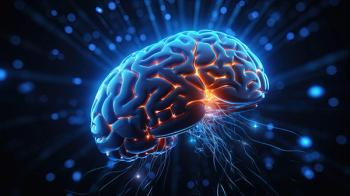
Spotlight on Neurostimulation: Research Innovation Award
Innovation award presented to early career psychiatrist promotes exploration and research in the use of neurostimulation for psychiatric disorders.
The first annual Innovative Young Investigator in Brain Stimulation Award was recently bestowed upon Tobias Schwippel, MD, for his work on noninvasive brain stimulation. As part of the award, Schwippel, Director of
“Dr Schwippel is a rising star pursuing new, and potentially meaningful, research approaches in
Psychiatric Times spoke with Schwippel about his passion for neurostimulation.
Psychiatric Times®: Having received the Innovation Award, you must be excited about the advances in neurostimulation. What’s new and exciting about the field?
Tobias Schwippel, MD: I am most excited about the possibility to individualize brain stimulation. In the future, brain stimulation will not only be tailored for every patient but will also be informed by the current state of the patient’s brain. To achieve this, many neurostimulation technologies will likely be combined with cognitive training, psychotherapy or medication, aiming for synergistic effects and thus maximizing effectiveness.
In the future, brain stimulation will not only be tailored for every patient but will also be informed by the current state of the patient’s brain.
Psychiatric Times: What do you want your colleagues to know about the safety and efficacy of neurostimulation for psychiatric disorders?
Tobias Schwippel, MD: Noninvasive brain stimulation has a very good effect and safety, because most neurostimulation technologies target a specific brain network or an anatomical location. This is unlike medications, which are distributed throughout the body andthus cause well known adverse effects not solely on the brain. The most common side effect of noninvasive brain stimulation is a transient headache and a tingling on the skin when the stimulation is applied that resolves after stimulation is stopped.
Efficacy for TMS is considered moderate and is roughly comparable to antidepressant medication, although in my opinion, the adverse event/efficacy ratio is advantageous for TMS. Newer brain stimulations techniques like transcranial direct or transcranial alternating current stimulation show promising results, but large clinical trials are still needed before treatment can be offered outside of research studies.
Psychiatric Times: What are your current research projects in psychiatry, and how might it impact patient care in the future?
Tobias Schwippel, MD: In Tubingen, Germany, I worked with Professor Christian Plewnia, MD, in 2 multicenter TMS trials. In one trial, we aimed to reduce auditory hallucinations in people with schizophrenia.2 In the other study, we used bilateral theta burst stimulation—a specific pattern of repetitive transcranial magnetic stimulation (rTMS)—to reduce depressive symptoms in major depressive disorder.3 In addition, I conducted a study to improve cognitive deficits in individuals with schizophrenia in which cognitive training was augmented with transcranial direct current stimulation (tDCS).4
More recently, I have worked with Professor Frohlich, in the Carolina Center for Neurostimulation utilizing transcranial alternating current stimulation (tACS) to reduce depressive symptoms. We are continuously improving our interventions,and recently started a study with closed-loop tACS. (Closed-loop means that brain signals are recorded during the treatment session and stimulation is only triggered when a certain brain state occurs.)
Psychiatric Times: How did you first get interested in this area?
Tobias Schwippel, MD: After I saw a video of the immediate effects of DBS (deep brain stimulation) on a patient with dystonia on the internet, I wanted to become a neurosurgeon and specialize in DBS. Throughout medical school I got increasingly interested in psychiatric disorders and the genuine connection between psychiatrist and patient. However, I have maintained my interest in brain stimulation and have focused on transcranial stimulation applications.
Psychiatric Times:How well is neurostimulation accepted in the United States as compared with Europe and Germany?
Tobias Schwippel, MD: Although cutting edge neuromodulatory research is conducted on both continents, the United States is better at translating scientific results into clinical application. The reason for this could be a general openness by both patients and psychiatrists in the United States to new treatment modalities as well as more industry sponsored research.
Psychiatric Times: What does earning this award to mean to you?
Tobias Schwippel, MD: It is an honor to be selected but even more a responsibility to continue my work to find new treatment modalities for symptoms of mental illnesses.
Do you know a psychiatric clinician who has received an award or honors? Share the news with us via PTEditor@mmhgroup.com.
References
1.
2. Plewnia C, Brendel B, Schwippel T et al.
3. Schwippel T, Plewnia C.
4. Schwippel T, Papazova I, Strube W, et al.
Newsletter
Receive trusted psychiatric news, expert analysis, and clinical insights — subscribe today to support your practice and your patients.







